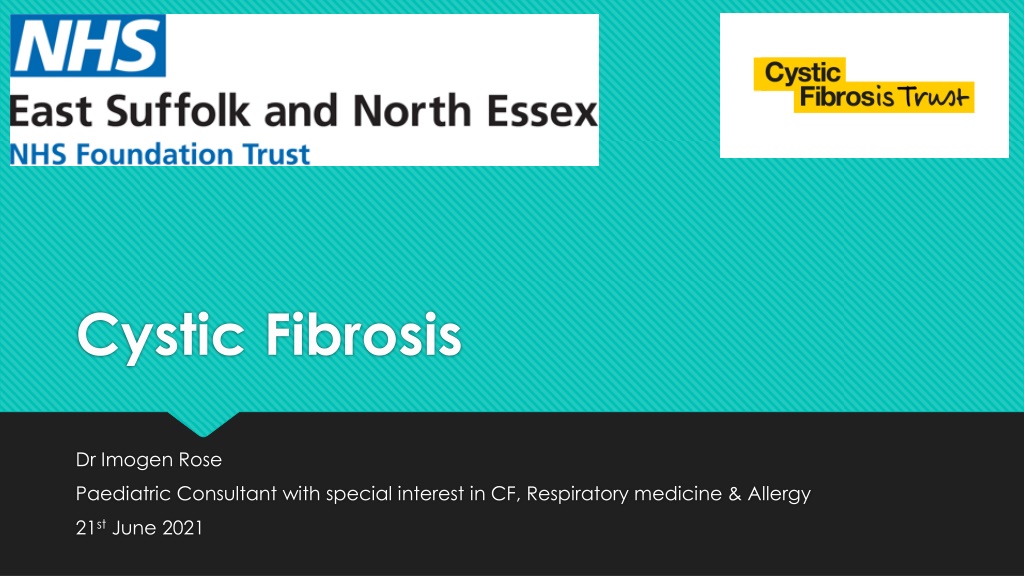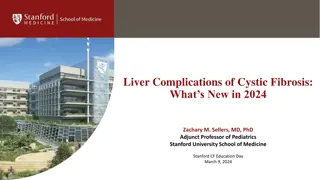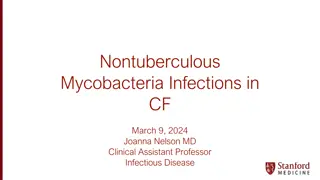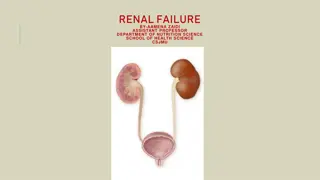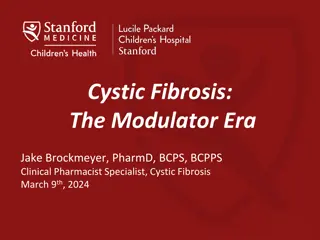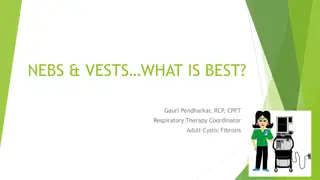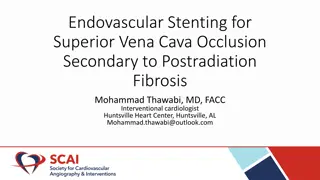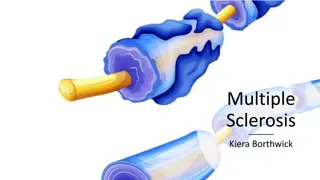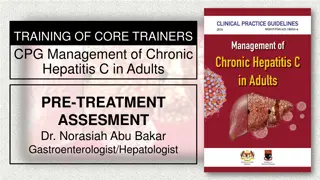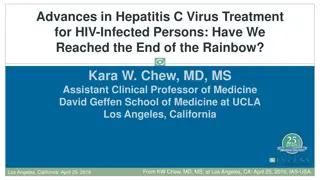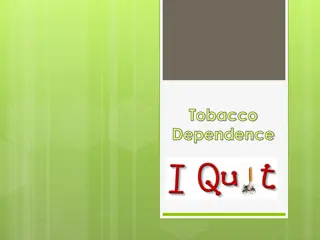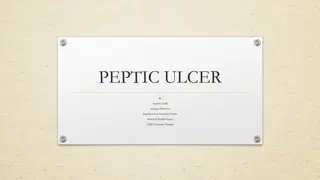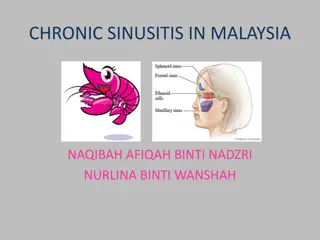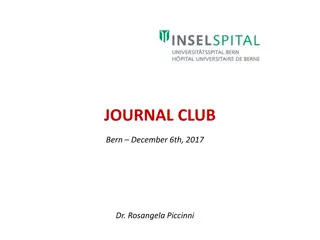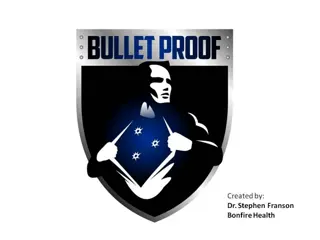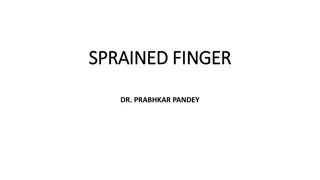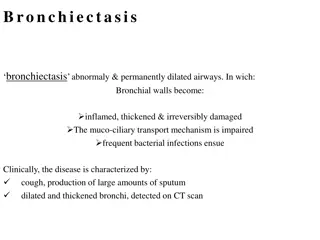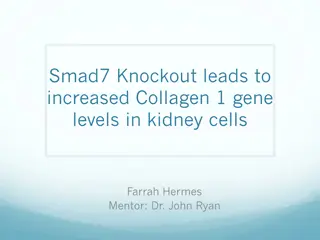Understanding Cystic Fibrosis: Causes, Symptoms, and Treatment Options
Cystic Fibrosis (CF) is a genetic condition affecting around 11,000 people in the UK. It disrupts salt and water movement in cells, leading to thicker, stickier mucus in the body. This condition can affect the lungs, digestive system, and pancreas, with symptoms such as chronic cough, digestive issues, and recurrent infections. Diagnosis involves carrier testing, newborn screening, and sweat tests. CF cannot be caught or developed; it is present from birth due to faulty CF genes. Treatment approaches vary based on specific gene mutations, emphasizing personalized care for patients.
Download Presentation

Please find below an Image/Link to download the presentation.
The content on the website is provided AS IS for your information and personal use only. It may not be sold, licensed, or shared on other websites without obtaining consent from the author. Download presentation by click this link. If you encounter any issues during the download, it is possible that the publisher has removed the file from their server.
E N D
Presentation Transcript
Cystic Fibrosis Dr Imogen Rose Paediatric Consultant with special interest in CF, Respiratory medicine & Allergy 21stJune 2021
Outline What is CF? How is it diagnosed? What causes it? How does CF affect the body? How is it treated? The CF team What can schools do to help? Resources available
What is CF? Genetic Affects 11,000 people in UK 2 people die/week from CF 5 babies born a week with CF 1 in 25 carry faulty gene Life-limiting condition 50% of those with CF will live until ~47
What is CF? Faulty gene that affects the body s ability to make or direct CFTR protein Disrupts the movement of salt and water in and out of cells Makes mucous thicker & stickier
How is it diagnosed? Carrier testing Antenatal testing (CVS or amniocentesis) Newborn screening Heel prick test since 2007 Sweat test >60 = CF
What causes it? Can t be caught or developed If you are not born with CF you will never have it but could be a CF gene carrier 1 in 25 people carry CF gene Everyone with CF will have 2 faulty or mutated CF genes >2000 mutations that can cause CF Specific mutation important as determines treatment personalised care
Lungs 15,000 miles of airways Normal lungs - Thin layer of mucous containing cilia to capture bacteria but, CF lungs - mucous is thicker & stickier so traps bacteria Chronic cough Wheeze SOB Recurrent chest infections
Digestive system Loose, greasy large volume stools Weight loss Constipation Nausea Swollen abdomen Reduced appetite DIOS blockages in small bowel GORD acid & non acid contents of stomach move in wrong direction
Pancreas Pancreas makes digestive enzymes that break down fats/protein & carbs Small tubes blocked with mucous Enzymes can t get out inflammation of pancreas Artificial enzymes (Creon) Scarring causes reduces production of insulin CFRD (CF related diabetes)
Liver Sits under R ribcage Largest solid organ in body Creates bile that digests fat in food Produces protein & hormones/ filters toxins 5-10% of CF patients will have liver disease Thicker bile, doesn t flow easily, causes irritation/scarring fibrosis
Fertility problems Women: Many have babies without fertility treatment but: Irregular/absent periods due to illness/underweight Thicker vaginal mucous which can make it harder for sperm to reach egg Men: 98% will have infertility - tube that carries sperm from testicles to penis (vas deferens) is either missing or blocked We discuss fertility in teenage years but still important to explain about STIs!
Additional symptoms Salty skin need to increase salt intake in hot weather/exercise Kidney & hearing complications medication s.e Sinusitis Nasal polyps Clubbed fingers Psychological impact is huge
How is CF treated? No cure .(yet) Antibiotics Physio (at least twice daily) Nebulisers Inhalers Enzyme capsules (every meal/snack) High fat diet Mucolytics (to thin mucous) (insulin/liver drugs) >40 tablets/day on average Lung transplant Oxygen CFTR modulators
The CF team Ipswich: Doctor me! Specialist nurse Karen Richards Physio Penny Brown, Ali Angell Dietician Lindsey Mowles Psychologist Dr Mel Powell Addenbrookes team (annual review & support of local team)
What can schools do to help? LOTS! Huge burden of care physio, meds, nebulisers etc takes a long time before & after school so understand if children late, tired or find it difficult to concentrate Persistent cough - is the body shifting the mucous out of the lungs. NOT INFECTIOUS. Can be embarrassing to cough but it helps keep lungs clear Enzyme supplements Creon too much or too little = abdo pain, urgent need to use the toilet Usual healthy eating guidelines don t completely apply as we need them to have high fat diet
What can schools do to help? Cant mix with other CF children Environmental bugs that can cause very difficult infections live in damp/rotting vegetation or stagnant water so may need some school trips/outdoor activities adapted MOST OF THE TIME THEY CAN STILL GO! Often health deteriorates over time not rapidly so safe for school trips with careful planning If CF well managed encourage them to work hard in PE & motivate them to get into optimal aerobic zones OK FOR THEM TO BE OUT OF BREATH! Be aware of ports
What can schools do to help? Sit them away from someone with heavy cold symptoms Seen in clinic for half day every 3 months and whole day once a year Hospital admissions antibiotics always 2-3 weeks so may be combo of hospital & home Stay in touch about homework Some children happy to talk about CF, others really private - talk to them about this, make sure everyone on the same page about sharing information with others
Summary: CF is a serious condition that an army of people are serious about beating for good There is hope! We need your support!
Resources CF trust www.cysticfibrosis.org.uk Section for teachers Five feet apart film released in 2019 Your local CF team! CF trust YouTube channel
References www.cysticfibrosis.org.uk www.cff.org ERS Handbook Paediatric Respiratory Medicine; E Eber, F Midulla; 1stedition; 2013 Paediatric Respiratory Medicine; J Hull, J Forton, A Thomson; 2ndedition; 2015 Concise Paediatrics; R Sidwell, M Thomson; 2ndedition; 2009
